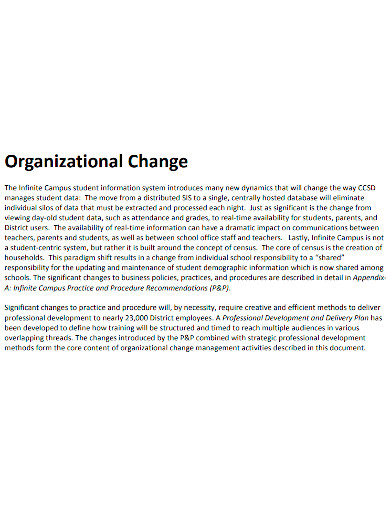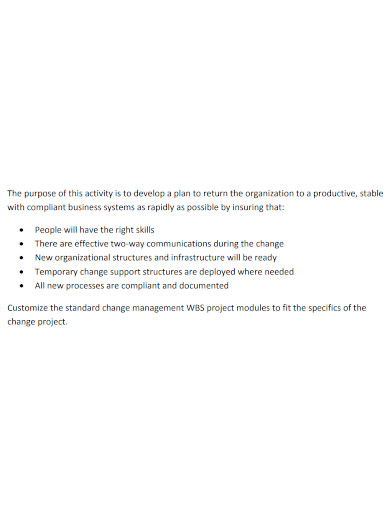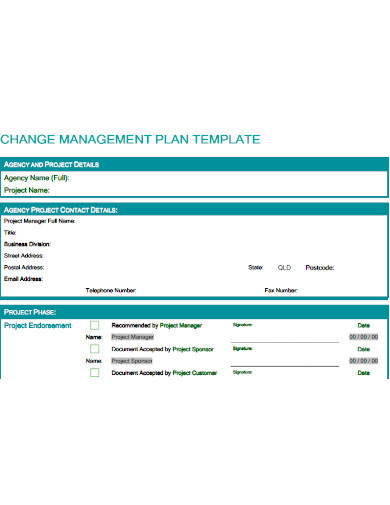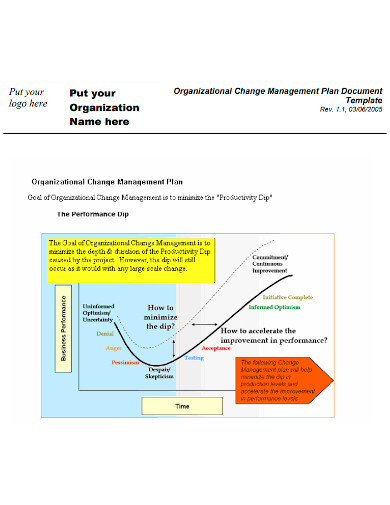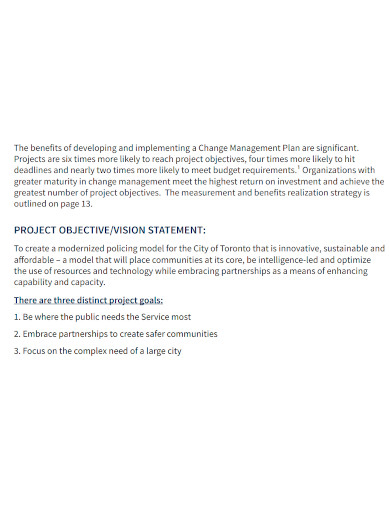A lot of factors can prompt change, this maybe because of external, internal or environmental influences. Anyone or anything can change and business organizations are not excluded from such. At some point organizations do undergo changes, this may be in its structure, culture or ideals. Whatever the reason this may be it is the role of a manger oversee organizational change or guide employees through it, it is important to know what the process looks like and what to expect. To learn more about Organizational Change Management Plan do continue reading this article and check out below our free templates on organizational change management plan samples.
4+ Organizational Change Management Plan Samples
1. Organizational Change Management Plan Sample
2. Organizational Change Management Plan Format
3. Printable Organizational Change Management Plan
4. Basic Organizational Change Management Plan
5. Editable Organizational Change Management Plan
What Is an Organizational Change Management Plan?
To be able to keep up with the times it is inevitable at some point that a business undergo some changes. This maybe initiatives to improve performance, seize opportunities or address key issues. Which often require changes to processes, job roles, organizational structures, and types and uses of technology. Change Management is defined as procedure that oversees and facilitates change at any level where it is needed. This could be a change at a project or team level or to a work process or system. Whenever this occurs, employees are one of the main components who are affected by this change. Whether requiring workers to learn new skills, reallocating responsibilities and priorities business would create an organizational change management. This would provides the steps and actions to take at the project or initiative level to support the hundreds or thousands of individuals who are impacted by a project.
How to Write a Organizational Change Management Plan?
Change at the organizational level, affects all employees in a particular company, including the individuals and teams working on various projects. Managing a successful organizational change can increase employee morale, drive positive teamwork and job enhancement. These factors can directly and positively affect productivity and quality of work. To be able to achieve this organizations must come up with an efficient organizational change management plan. To start off, here are some key components you should consider as you come up with an organization change management plan.
I. Define What Needs to Be Changed
There must be a concrete reason why management needs to implement change. Establish precisely what they are trying to achieve, with activities such as developing a detailed change profile and defining what success on the project looks like. Benefits should be clearly defined so that everyone involved understands the advantages of proceeding with the change.
II. Who and What Are Involved
Management must then identify the groups and people who will need to change as the result of the project and the ways each will need to change. Determine what the change will impact, including any business policies, processes, job roles, and organizational structure.
III. Define Approach
Consider what steps they will need to take to achieve project success, engaging in activities such as risk assessment, identifying potential resistance, and establishing required roles. Employees should be aware of any leadership changes, receive employee coaching and employee training in order to adapt to the changes.
IV. Track Performance
Monitor and sustain progress in the change management efforts, using activities that include establishing a tracking calendar and identifying employee performance, project’s strengths and opportunities. While everyone is in the process of adapting the change in management strategy, prepare adaptive actions and continuing to track performance.
V. Reassessing Performance
Reflect on performance to confirm desired results, with activities such as reviewing results and documenting lessons learned to monitor if the change has been fully adapted into the organization.
VI. Activate Sustainment
Focus on implementing actions to preserve the change outcomes, engaging in activities like identifying gaps and activating relevant sustainment roles.
VII. Transfer Ownership
The change management team should interact with stakeholders, addresses concerns, and oversees a smooth change transition. Roles within the team require clear definition, including outlining each member’s responsibilities. Demonstrate how to carry sustainment efforts forward, with important activities that includes transferring knowledge and assets.
FAQs
What Is Digital Transformation?
Digital Transformation is the integration of digital technology to create new or modify existing business processes, culture, and customer experiences to meet changing business and market requirements.
What Are the 4 Major Components of Organizational Change?
The four pillars that sustain change are planning, leadership, management, and maintenance of change.
What Is a Change Manager?
A change manager supervises the change management team to meet objectives on time and on budget by increasing employee adoption and usage.
Overall, it is hard to defy change. And in the business world it is an inevitable event that would eventually occur no matter what, whether at an individual level or organizational/initiative level. And to be able to experience this you will see the value and importance of a organizational change management plan and how this could help your business through this transition period.
Related Posts
FREE 9+ 30-Day Marketing Plan Samples in PDF | MS Word | Apple Pages | Google Docs
FREE 3+ Sales Team Action Plan Samples in PDF | MS Word | Apple Pages | Google Docs
Marketing Plan For Small Business Samples
FREE 7+ Fashion Business Plan Samples in PDF
FREE 10+ Sprint Planning Samples In MS Word | Google Docs | PDF
FREE 10+ Wedding Planning Samples in MS Word | Apple Pages | Powerpoint | PDF
FREE 9+ Monthly Study Planner Samples in PSD | Illustrator | InDesign | PDF
FREE 9+ Sample Curriculum Planning Templates in PDF | MS Word
FREE 10+ Teacher Development Plan Samples in MS Word | Google Docs | Apple Pages | PDF
FREE 10+ Basketball Practice Plan Samples in PDF
FREE 12+ School Business Plan Samples in PDF | MS Word | Apple Pages | Google Docs
FREE 7+ Client Strategic Plan Samples in PDF | MS Word
FREE 11+ Trucking Business Plan Templates in PDF | MS Word | Google Docs | Pages
FREE 7+ Small Hotel Business Plan Samples PDF | MS Word | Apple Pages | Google Docs
FREE 14+ Bakery Business Plans in MS Word | PDF | Google Docs | Pages

